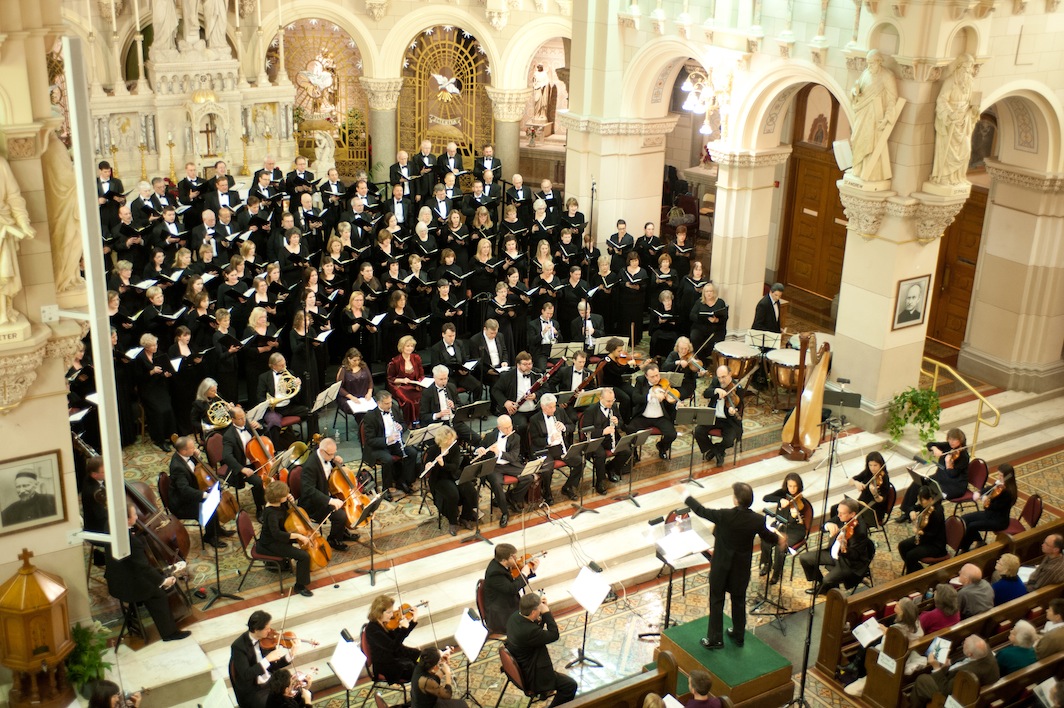From Beethoven to Holst, Chicago Master Singers present an array of sacred music

To be noticed in Chicago’s sprawling classical scene, dominated by a world-class symphony orchestra and opera company, smaller organizations have to find a niche.
And that’s exactly what the Chicago Master Singers has done. The 33-year-old chorus takes on repertoire often outside the purview of many other area groups and performs it with zest and sophistication. Sunday evening’s program at Divine Word Chapel in Techny was a case in point. While the composers—Ludwig van Beethoven, Ralph Vaughan Williams and Gustav Holst—were all familiar, most of the featured works are infrequently heard.
The main exception was Beethoven’s Mass in C, Op. 86, but even that work falls under the long shadow of the composer’s much better-known Missa Solemnis, which was completed more than 20 years later in 1823. Though the Mass is considerably smaller in scale, running some 40 minutes shorter than the later work, and lacks its complexity and grandeur, the earlier composition nonetheless packs plenty of power of its own.
The 120-voice Master Singers made that very clear, bringing focus and energy to Sunday’s first-rate performance. A skilled conductor, music director Alan Heatherington seemed right at home in this work, making the most of the work’s contrasts in tempo, dynamics and moods and giving voice to its inner drama. He drew the best from this impressive, obviously well-prepared group of community singers, skillfully meshing them with the four soloists and the Ars Viva Symphony Orchestra.
There were highlights aplenty, such as the second Miserere nobis (“Have mercy upon us”) in the rhythmically driven Gloria, with the words repeated with a deftly realized difference in accentuation and expressiveness. Or the solemn, moving opening of the Sanctus, which is interrupted with a loud, joyful ode to the glory of God, ending with the familiar words, “Hosanna in the highest.” The four soloists—soprano Michelle Areyzaga, mezzo-soprano Sarah Holman, tenor Peder Reiff and bass-baritone Gerard Sundberg—capably handled their parts.
Setting the stage for the Mass and making for an all-Beethoven first half were two little-known songs by the composer, beginning with a wonderfully simple, gentle elegy written for the death of a friend, Elegischer Gesang, Op. 118. Next came the Opferlied, Op. 121b, a setting of a Goethe poem, heard here in the 1824 version for soprano soloist, chorus and chamber orchestra. Unfortunately, this was the weakest part of the evening, with Areyzaga doing little to animate the text.
The second half of this evening of all-sacred music jumped to England and the 20th century for a group of songs and two psalm settings. In some ways, these selections seemed a bit anticlimactic after the Mass, which easily could have been the culminating work of the evening. But in the end, this approach worked out well enough.
This part of the program started with Vaughan Williams’ Five Mystical Songs, setttings of poems by George Herbert. The first four were more intimate, centering on Sundberg, a professor of voice at the Wheaton Conservatory of Music, with the chorus adding a few musical accents here and there. He is a fine singer with impeccable technique and ample power, but little about his interpretation was particularly distinctive or memorable. Offering a big switch in tone was the fifth song, simply titled “Antiphon,” a jubilant selection performed by the full chorus.
Rounding out the evening were two psalm settings by Holst, selections that seem a long way from The Planets yet are quite effective in their way. Psalm 86 spotlighted Reiff and Areyzaga with the chorus. Psalm 148 featured the chorus, singing for the first time in the program mostly a cappella—an unexpected and welcome contrast that provided a striking cap to the evening.
The main debit in this concert was the sound in Divine Word Chapel, a beautiful, Romanesque church, where the Master Singers perform all their events. Although most churches with stone walls and floors have reverberant acoustics, the layout of this structure distorts the sound in small yet significant ways, dampening the lower registers and making the music seem unnaturally bright. Not helping matters is the configuration of the choir, which is top-heavy with female voices, a disequilibrium that is exaggerated by the chapel’s acoustic.
That said, this past weekend’s program was a strong outing for Chicago Master Singers, which, by almost any measure, has to be considered among the city’s top choral ensembles.
Kyle MacMillan is the former classical music critic of the Denver Post and a 2004 recipient of a USC Annenberg/Getty Arts Journalism Fellowship. He is a regular contributor to the Chicago Sun-Times and has also written for such magazines as Opera News, Symphony and Chamber Music.
Posted in Uncategorized

